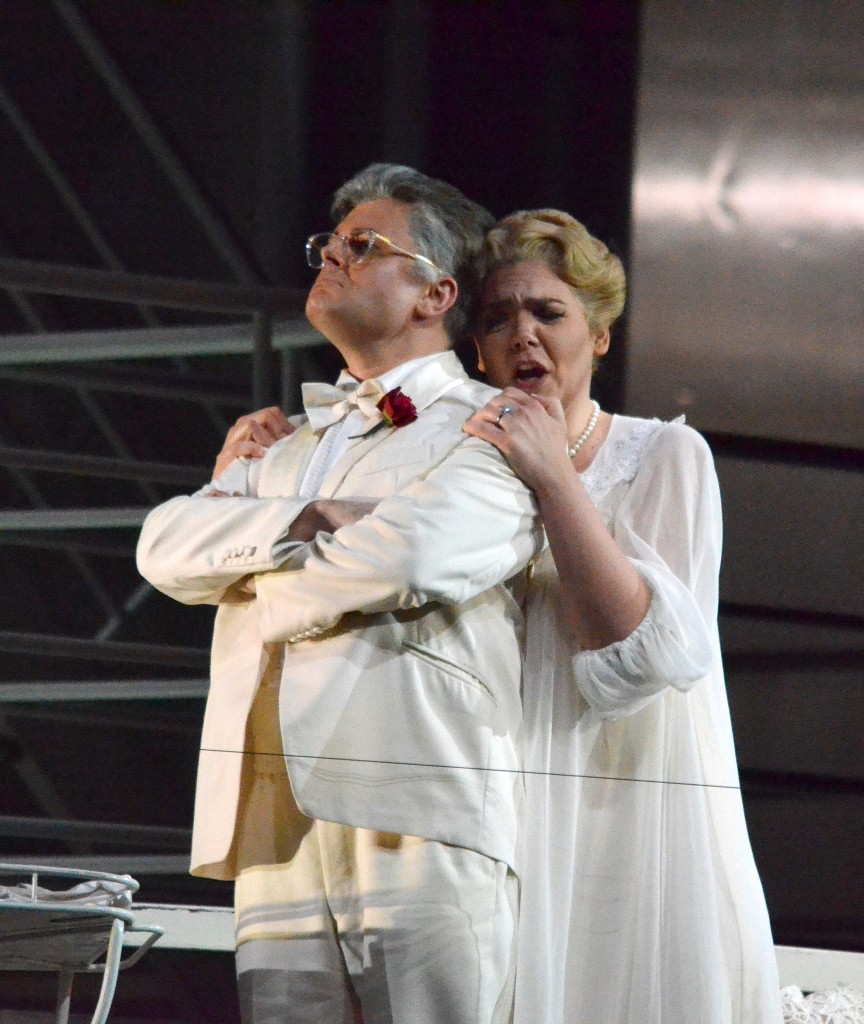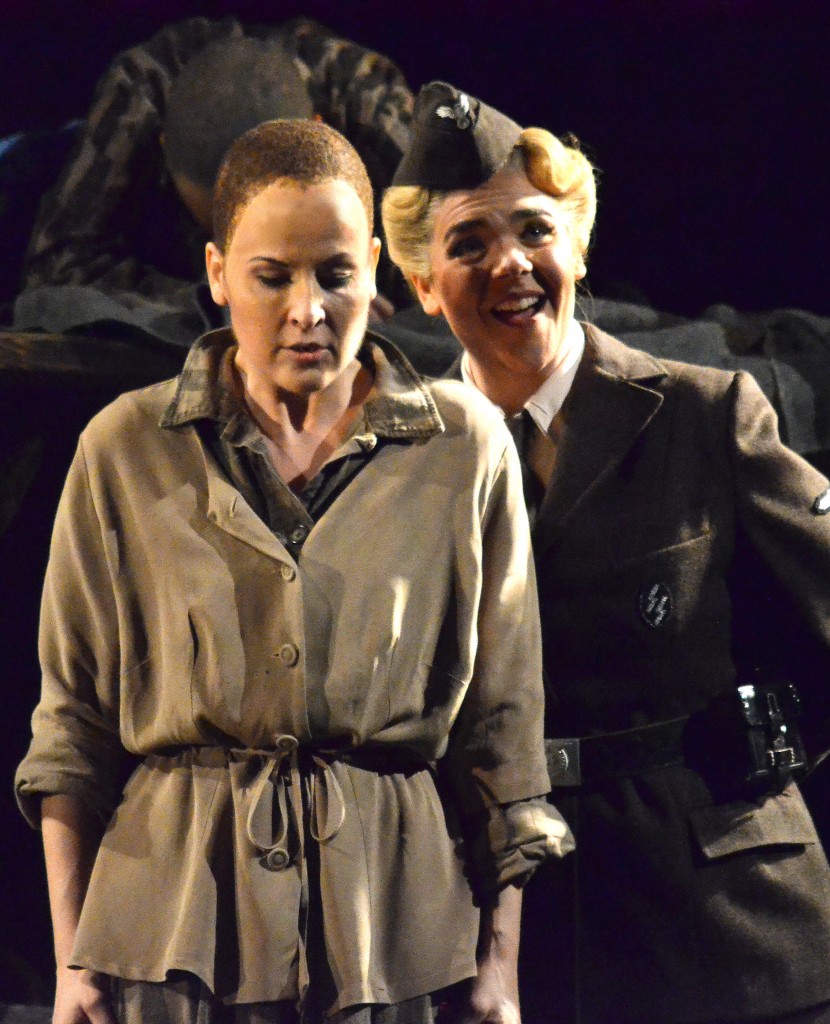FGO’s “The Passenger” proves a gripping and spectacular experience
With the opening-night performance of The Passenger, Florida Grand Opera attempted the almost insurmountable challenge of bringing Auschwitz to the opera stage.
The result was a gripping, visually spectacular, overlong and musically strange experience Saturday night that was completely absorbing, even if it provided few of the conventional operatic pleasures of Puccini, Verdi or Mozart.
The challenges were apparent before the orchestra played the first notes. The Arsht Center contained an unusual number of empty seats for an opening night, something that presumably won’t be a problem with next season’s opener of Carmen. And FGO general director Susan Danis came on stage and asked for a moment of silence in memory of those who perished in the Holocaust and those who survived.
The Passenger tells the story of Liese, a former SS officer, traveling on an ocean liner with her husband Walter, a West German diplomat on his way to a new posting in Brazil. He knows nothing of her past. During the voyage, she sees a mysterious, white-veiled woman she thinks she recognizes as a former inmate. She confesses to her husband, and soon the opera shifts to the women’s barracks at Auschwitz, where inmates endure beatings and the ever-present threat of the gas chambers, comforting each other and talking about their past lives and fragile hopes for the future. Nazi brutality is everywhere, with beatings, cat-and-mouse questioning of prisoners and a lineup to select inmates for the gas chamber.
The composer, Mieczyslaw Weinberg, was a Polish Jew who fled to the Soviet Union ahead of the Nazis in 1939. He composed the opera to a libretto by Alexander Medvede, which was based on a radio play by Zofia Posmysz, an Auschwitz survivor. Although he completed the opera in 1968, it was not given a fully staged performance until a 2010 festival in Austria, where it was directed by David Pountney in the production that now appears on the FGO stage.
In the music, many critics have heard the stamp of Weinberg’s patron, Shostakovich. While Weinberg’s harmonies sound even more modern–at times even atonal–he composed with similar instrumentation and sensibility as his friend, if without Shostakovich’s melodic gift.
There were bleak wind solos over long-held notes in the strings and shrieks in winds and brass. A swirl of notes on xylophone or similar instrument suggested Liese’s mental disintegration as she confronted her past. Grim and ghostly music came from the violins as the inmates trudged into their barracks. As with Shostakovich, the mood of ostensibly cheerful music didn’t survive a pass through his compositional style, with one of the few memorable melodies described by Liese as a “hellish waltz.” Yet there was a sameness and lack of invention to the music, with its relentless tone of brutality and sadness understandable given the setting but the lack of variety detracted from the opera’s overall effectiveness.
Led by conductor Steven Mercurio, the FGO orchestra gave a committed performance that effectively brought forth Weinberg’s whirling, often nightmarish kaleidoscope of sounds. While it’s difficult to imagine coming home after a long day and inserting a CD just to listen to one lovely aria at the end of the first act, the music served the drama with undeniable power.
The set was the most impressive seen on an FGO stage in years. Created by the late Johan Engels, it is a revolving, two-tiered design that allows the action to move seamlessly from the ship to Auschwitz, as Liese’s terrible memories haunt her. At the top, the sunny present is portrayed on the ocean liner where everything is white, from the ship’s funnel to the stateroom furniture to the clothing of the passengers and crew.
Below is Auschwitz. When the concentration camp first appeared, it was one of the most stunning moments of the evening, as the set revolved and the carefree atmosphere of the liner’s deck gave way to the concentration camp. Harshly illuminated by floodlights, the camp appeared with its railroad tracks and barracks, as orders were barked in German, made more sinister by coming in cracking tones over a loudspeaker.
Part of the effectiveness of the work comes from the composer and librettist steering clear of what we might expect on this topic. Although Weinberg lost his parents to the Holocaust, he chose to use a libretto in which Jewish inmates at Auschwitz play little role, with the larger roles involving a Polish Catholic, a Russian partisan and others whose backgrounds aren’t disclosed. In giving a prominent role to Liese and her guilt, he humanizes–but does not excuse–an SS officer. And the opera did not offer a neat, conventionally satisfying ending, leaving the audience with no easy answers or catharsis that could make sense of what happened, just a sense of loss, ambiguity and overwhelming sadness.
Running for three hours with one intermission, the opera could really benefit from some cuts. A trio of German officers added little, as they complained about the difficult but “honorable” work of mass killing to cleanse the Reich, coming off as little but Nazi clichés from countless films. Their evil was apparent enough in their beatings and verbal abuse of the inmates. A dark-suited male chorus appeared occasionally to comment on the action, also adding little but distraction to scenes that needed no elaboration. And throughout, several scenes went on just a few minutes too long.
The large cast, with its guards, officers and inmates, contained not a single weak link, with particularly strong performances in some of the smaller roles.
As Liese, the mezzo-soprano Daveda Karanas gave a richly textured performance, with a gleaming voice and first-class acting. She effectively communicated a person being overwhelmed by guilt, as her desperate rationalizations failed her (“I never beat anyone. They appreciated that.”). And somehow, despite her participation in terrible crimes, she came off as more appealing that her weaselly husband, whose horror at learning of her past evaporated when it appeared the secret was safe and would not impede his career.
As Walter, her husband, the tenor David Danholt was very much the suave, silver-haired diplomat, whose outward confidence concealed a weak and shallow nature.
The soprano Adrienn Miksch gave a brave, searing performance as Marta, the inmate whom Liese thinks she sees on the ship. With her hair cropped short, clad in an inmate’s uniform, she floated high notes and spun long lines of disjointed melody, at one point singing on her birthday in praise of death. In one of the most affecting scenes, she unexpectedly encounters her lover, the violinist Tadeusz, and they join in a desperate love duet, as he assures her she is still beautiful and they reminisce about their past time together, knowing they have nothing to look forward to.
The baritone John Moore sang the role of Tadeusz with a warm humanity, communicating the persistence of decency and courage. In one of the final scenes, in which he defiantly plays the Bach Chaconne rather than the commandant’s favorite waltz, he was replaced by the violinist Franz Felkl, a member of FGO’s violin section, who drew out the opening chords of the Bach with organ-like resonance.
There were several standouts among the smaller roles. As the Russian inmate Katja, the soprano Anna Gorbachyova gave one of the most dramatic performances of the evening. Her shaved head bloody from beatings, she sang with a lyricism that communicated vulnerability and strength, as she defied the Germans while retain her humanity and concern for the other inmates.
As the maternal Polish woman Bronka, Kathryn Day was affecting as she prayed to Jesus for better times, when the children would be fed and clothed. In one scene, she and Elena Galvá, as the young French girl Yvette, sat on a bunk, their legs dangling, as they tentatively reached across barriers of language and age, forming a fragile connection amid the surrounding brutality.
The Passenger runs through April 9 at the Arsht Center in Miami. fgo.org; 800-741-1010.
Posted in Performances
4 Responses to “FGO’s “The Passenger” proves a gripping and spectacular experience”
Leave a Comment
Sun Apr 3, 2016
at 1:48 pm
4 Comments









Posted Apr 03, 2016 at 5:01 pm by Jack Firestone
Should not be missed. It only runs a week. This is likely the performance of the season. You’ll be sorry if you miss it.
Posted Apr 03, 2016 at 9:42 pm by Aaron
I agree with the above comment – not to be missed. I felt I could’ve been in any world capital seeing a production of this magnitude: great singing, inventiveness of production, execution in staging and lighting. The versatility of set design was so perfect for this storytelling; I find it hard to imagine the opera in a different production and it’s of no surprise that it has been done in so many cities.
I think it’s unfair to criticize the work for its length or musical material for fear that it might dissuade operagoers who would be completely satisfied with the dramatic aspects of the opera and how the atonal music serves it. Weinberg is Weinberg: though he’s not well-known, those who do know him would probably agree he’s no tunesmith nor pretends to be. And I personally find Act II of Madama Butterfly a little too long, but I wouldn’t be critical of Puccini.
Posted Apr 04, 2016 at 3:19 pm by Galina V Nikiforova
It is indeed a “musically strange experience”, not what I want to see on an opera stage.
Posted Apr 10, 2016 at 8:30 am by David Presler
Excellent review, David… The opera, in fact, was not too long. I was on stage for the entire opera each night, in the Chorus, and I must say, the length was perfect. Better to suggest, possibly, that the audience needed to prepare for such an experience.
The opera went beyond the traditional operatic sensibilities of common drama and 18th century antics and intrigue. The Passenger took this Art Form and left a Legacy for 6 Million who perished, in light of a sub-culture of Holocaust Denial.
The piece was inspired by Weinberg. I wish you would have seen it again the following week. The acting went deeper, and had an organic flow.
Thank you for your excellent review. I guess you feel you have to say SOMETHING in need of correction. 3 hours is nothing in comparison to the years spent in Auschwitz and nothing in comparison to the years it has impacted our nation and people.
I thank FGO for taking on this production!
Cantor David Presler